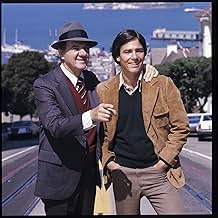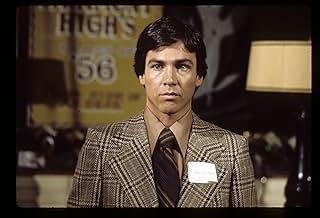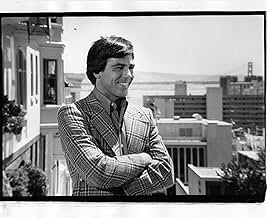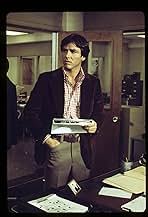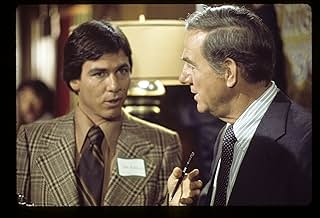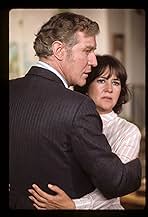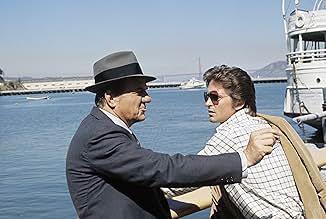Un policía veterano con más de veinte años de experiencia se une a un joven inspector para resolver crímenes en San Francisco, California.Un policía veterano con más de veinte años de experiencia se une a un joven inspector para resolver crímenes en San Francisco, California.Un policía veterano con más de veinte años de experiencia se une a un joven inspector para resolver crímenes en San Francisco, California.
- Nominado para 16 premios Primetime Emmy
- 4 premios y 24 nominaciones en total
Explorar episodios
Reseñas destacadas
San Francisco was still like THIS! Karl Malden dispensing wisdom, Michael Douglas dispensing testosterone, new Fords as far as the eye can see, and only a hint of the depravity that the city exudes. Good stories, well directed, thoughtful in short doses. Worth your time until Douglas exits, then it fades to black.
Just the opposite of Dirty Harry. Where Eastwood spent his time ranting against and beating up, shooting, or threatening hippies, women, and Blacks, these were San Francisco detectives in a show with a social conscience even while they tried to catch criminals.
Gays are depicted positively. Blacks shown sympathetically, even if guilty of crimes. Outcasts of all kinds are shown as victims of circumstances.
Probably the height of its progressive sensitivity was an episode with one of Arnold Schwarzenegger's first roles. He plays a bodybuilder who accidentally kills a woman who mocked his muscle flexing. Surprisingly, his acting was better than in most of his films.
Gays are depicted positively. Blacks shown sympathetically, even if guilty of crimes. Outcasts of all kinds are shown as victims of circumstances.
Probably the height of its progressive sensitivity was an episode with one of Arnold Schwarzenegger's first roles. He plays a bodybuilder who accidentally kills a woman who mocked his muscle flexing. Surprisingly, his acting was better than in most of his films.
It was not only that Karl Malden and Michael Douglas had good chemistry for four out of five seasons, they did. But it was a friendly generational rivalry in looks and style.
Back in the 40s and 50s on the big screen and small detectives all looked like Karl Malden with the button down shirts and the obligatory fedora. But in 1972 when The Streets Of San Francisco made its debut Malden was dinosaur from another era. So without one big of dialog set you had a generation gap the second Michael Douglas in a hip outfit for the Seventies or as hip as a police force allows you to be.
But there was no conflict, an occasional disagreement as the older cop taught the younger one. But it wasn't that Malden was always right. Occasionally Douglas taught Malden a thing or two about reaching the younger generation when it was necessary to solve a case.
Douglas left the show in 1976 and Richard Hatch became Malden's new partner. But they never quite got it together as a team the way Malden did with Douglas.
I liked the show, I liked the stories. But most of all Malden and Douglas were a joy to watch.
Back in the 40s and 50s on the big screen and small detectives all looked like Karl Malden with the button down shirts and the obligatory fedora. But in 1972 when The Streets Of San Francisco made its debut Malden was dinosaur from another era. So without one big of dialog set you had a generation gap the second Michael Douglas in a hip outfit for the Seventies or as hip as a police force allows you to be.
But there was no conflict, an occasional disagreement as the older cop taught the younger one. But it wasn't that Malden was always right. Occasionally Douglas taught Malden a thing or two about reaching the younger generation when it was necessary to solve a case.
Douglas left the show in 1976 and Richard Hatch became Malden's new partner. But they never quite got it together as a team the way Malden did with Douglas.
I liked the show, I liked the stories. But most of all Malden and Douglas were a joy to watch.
Republic Pictures' five released VHS videos which represent eight different episodes are, I hope, the first of a complete series release. In recent years, "Streets" has been relegated to the pre-dawn graveyard of Indie and cable television stations, edited down to allow for more ghastly, no-budget local ads (trade schools, lawyers, and the like). Nowadays, low self-esteem broadcasters plaster their logos and moving promo messages along the bottom of the as if the program is an interruption of their commercials. So, what a treat to see these classic episodes without all of these distractions.
Although popular enough to run for five seasons, it never received the credit it deserved -- none of the hype of a "Charlie's Angels," for example. It's too bad that Michael Douglas didn't stick with the show. His performances in "Streets" and "The China Syndrome" are among his best. I'm crossing my fingers that he'll consider returning to a follow-up "Streets" later in his career, taking the senior detective's role that Malden held in the original.
"Streets" always had tight scripts, good plotting, and interesting characters -- even if they pandered to stereotypes a little. Way ahead of its time, gay themes are treated with surprising tact and good taste. In the episode "Harem," guest star Rick Nelson plays a gay pimp for female prostitutes (a novel idea in and of itself). The word "gay" is never used, but Steve (Douglas) simply tells Mike (Malden) that, "he's not exactly what you'd call a ladies man."
The two-hour special "Thrill Killers," is perhaps the most interesting release. Patty Duke Astin plays a not-too-thinly disguised Patty Hearst (a headline story at that time) who takes a whole jury hostage and begins killing them one by one. It's a relief not to have to wait a week to see part two.
The least interesting of these releases is "Dead Air," starring Larry Hagman as a radio talk show host (reminiscent of Bill Balance's Feminine Forum, an innovative show at the time). The studio scenes are completely unrealistic and the killer can be guessed before the end of Act 1.
Unfortunately, none of these eight releases includes an episode from "Streets" most famous director, Richard Donner ("The Omen" and "Lethal Weapon" series.) Maybe they'll release some of his episodes on DVD with a director's commentary? Also missing is what I consider to be the best episode of the series, "Mask of Death," which has an amazing performance by John Davidson as a female impersonator.
Although popular enough to run for five seasons, it never received the credit it deserved -- none of the hype of a "Charlie's Angels," for example. It's too bad that Michael Douglas didn't stick with the show. His performances in "Streets" and "The China Syndrome" are among his best. I'm crossing my fingers that he'll consider returning to a follow-up "Streets" later in his career, taking the senior detective's role that Malden held in the original.
"Streets" always had tight scripts, good plotting, and interesting characters -- even if they pandered to stereotypes a little. Way ahead of its time, gay themes are treated with surprising tact and good taste. In the episode "Harem," guest star Rick Nelson plays a gay pimp for female prostitutes (a novel idea in and of itself). The word "gay" is never used, but Steve (Douglas) simply tells Mike (Malden) that, "he's not exactly what you'd call a ladies man."
The two-hour special "Thrill Killers," is perhaps the most interesting release. Patty Duke Astin plays a not-too-thinly disguised Patty Hearst (a headline story at that time) who takes a whole jury hostage and begins killing them one by one. It's a relief not to have to wait a week to see part two.
The least interesting of these releases is "Dead Air," starring Larry Hagman as a radio talk show host (reminiscent of Bill Balance's Feminine Forum, an innovative show at the time). The studio scenes are completely unrealistic and the killer can be guessed before the end of Act 1.
Unfortunately, none of these eight releases includes an episode from "Streets" most famous director, Richard Donner ("The Omen" and "Lethal Weapon" series.) Maybe they'll release some of his episodes on DVD with a director's commentary? Also missing is what I consider to be the best episode of the series, "Mask of Death," which has an amazing performance by John Davidson as a female impersonator.
I like those crime shows of gone times, as crime shows and movies where about crime and not about personal drama of the detectives or suspects. The show now lives mainly from the great chemistry between Karl Malden and Michael Douglas and the fine 70s flair in Frisco. The stories may look from today's perspective to some rather simple and standard but remember this show was aired first in the 70s, so this is not the copy but the original. Still good + refined by nostalgia.
¿Sabías que...?
- CuriosidadesBy all accounts Karl Malden and Michael Douglas developed a strong professional and personal relationship from their time on the series. Twenty years after last working together on an episode they were both onstage at the 1996 People's Choice Awards. Malden referred to Douglas as "the son I never had" and mentioned that he had wanted producer Quinn Martin to cast Douglas on the series. Douglas responded to the compliment by calling Malden "my mentor," and both also expressed that they enjoyed working together on the show.
- Créditos adicionalesEnd credits (from seasons 2-5): Photographed Completely On Location in San Francisco. In season 1, the production was split with exteriors filmed in San Francisco and interior scenes filmed at the Burbank Studios in Burbank, California.
- ConexionesEdited into The Green Fog (2017)
Selecciones populares
Inicia sesión para calificar y añadir a tu lista para recibir recomendaciones personalizadas
- How many seasons does The Streets of San Francisco have?Con tecnología de Alexa
Detalles
- Fecha de lanzamiento
- País de origen
- Idioma
- Títulos en diferentes países
- The Streets of San Francisco
- Localizaciones del rodaje
- Empresa productora
- Ver más compañías en los créditos en IMDbPro
- Duración
- 1h(60 min)
- Color
Contribuir a esta página
Sugerir un cambio o añadir el contenido que falta

